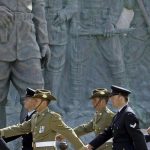Independent of the results in Istanbul, many see the 31 March local polls as a turning point for Turkey. Let’s have a close look.
Firstly, the bloc opposing Turkish President Recep Tayyip Erdoğan and the system in Turkey, which amounts to half of society, rekindled its belief that the regime can be changed via elections. Whether there will be snap elections in the near future or not, the 31 March dynamic unleashed in local polls needs to be maintained.
Yet, is it possible for the opposition to transform this dynamic into alternatives politics without embracing the Kurds and without changing its way of understanding the regime?
It is not. Because it is not likely for the other groups in the opposition to come together with voters of the Kurdish People’s Democratic Party (HDP) in a political platform. This is only a one-way street, a hand offered by the HDP to others, and that move is mainly tactical. The system on the other hand is totalitarian and the HDP is the only party that understands and voices this point.
In that context, let’s discuss what the other opposition parties have failed to grasp from the outcome of local polls. As all serious surveys show, the main opposition Republican People’s Party’s (CHP) mayoral candidate Ekrem İmamoğlu won the election in Istanbul thanks to HDP voters. This was also the case in Adana, Ankara, Antalya, and Mersin.
Despite this, nothing suggests that the “national” opposition has internalized that fact. The HDP is left completely by itself in Kurdish populated cities, and 50 of its 70 elected mayors still await their certificates from the Supreme Election Board (YSK).
Not a single voice from the other opposition parties has been raised about the certificates denied to HDP’s mayors, or on the Supreme Election Board’s decision that mayors who were previously dismissed from public sector jobs are not eligible to receive their mandate, or on the rejections of the local election councils to HDP’s appeals against obvious irregularities, while the CHP in Istanbul is rightfully making a great fuss about the YSK dragging its feet to authorize the elected mayor. Let me repeat it again, not a single voice!
Is it surprising? No, it is not. The HDP has been excluded from the official description of the political opposition in Turkey. This national opposition is no different than the government, which, ahead of elections, openly treated HDP voters as ‘foreigners’ and ‘non-national’ people.
The first ones who should think about this are the HDP’s policy makers. Unfortunately, votes cast tactically affect only election outcomes in Turkey, not the political alliance beyond it. Of course, that does not mean that the tactical alliance is not important, but it is clearly not a success for the HDP’s policy of becoming a party embracing all Turkey.
Let’s also talk about the local governments. The central government has the powers to pull the administrative, financial, and legal strings of municipalities won by the national opposition. We will see rapidly the limits those municipalities face in making their own decisions. Right now, the euphoria of victory prevails.
Ekrem İmamoğlu’s position on the other hand goes beyond local governments. He has suddenly emerged as the new opposition leader of Turkey; however, this position is not sustainable given the limits of mayoral powers, his party, and the political system as a whole.
First of all, İmamoğlu will be “authorized” as mayor only if Erdoğan gives his consent. And the moment he is authorized, he will find himself under financial and administrative tutelage as well as judiciary pressure. His claim to make a new start in Istanbul is baseless.
“What this city thinks and wants in terms of national policies, we will develop vanguard policies on those issues. With those policies, we will help and support Turkey’s higher-level policies,” İmamoğlu said in Istanbul while speaking at a post-election rally. This is not possible, either under normal conditions in Turkey or in the existing regime. It will also not be easy for the CHP to accept İmamoğlu as its new leader.
What about the opinion leaders of the government and the opposition who are enthusiastic to reinvent democracy from the March 31election results? People in opposite camps unconsciously coalesced around a common national stance on that issue. While the commentators of the government say that even the existence of polls indicates the existence of representative democracy, “national” opponents marketed the results telling the fairy tale that this election “proved the resilience of competitive Turkish democracy”. This sort of nonsense is uttered while the country has become a dumpsite for the rule of law and justice and an empire of evil.
Another “national” opposition wing argued that pending the final result of the Istanbul mayorship, the elections were between legitimacy and illegitimacy, and that Turkey was at a crossroads between democracy and authoritarianism.
None of these commentators wanted to see that the legitimacy of the election results had been destroyed by the regime on 7 June 2015 when in parliamentary elections the ruling AKP lost its majority and called for snap elections. From then on, the elections were legitimate only when they were won by the regime. I wrote in July 2015 about Erdoğan: “The organization at its disposal (the AKP) is ready to try everything, including war, until they have won the election alone, and thus, until a government is established that will make him untouchable and immortal, they will burn down and destroy everything”.
If democracy is “to surrender power when the election is lost”, this simplest criterion was not implemented on June 7, 2015. For the first time, the regime refused the results of the popular vote, the main basis of its legitimacy.
This is where Turkish democratic standards are… And writing that the country is at a critical junction for democracy, while in fact it is going full speed against the wall at the end of a one-way street is simply revolting.
Unfortunately, such comments cannot be interpreted as illusions. Taking 31 March as the starting date for the discussion of legitimacy not only means accepting the legitimacy of all the elections held since June 7, 2015, it also legitimizes the system imposed after those polls.
Just as the main opposition party, which avoids questioning regime’s illegitimacy as it was the very subcontractor of the very illegitimacy, today screams “we won the election organized by the regime, give us our mayoral certificates” … Did not İmamoğlu say before the elections that his party will never question the legitimacy of the president?
The only difference between elections starting from June 7 and the polls of 31 March is that the government faced a defeat despite all types of tricks it used. This does not mean that the problem of illegitimacy started on March 31, it means the voters are again questioning regime’s legitimacy. Yet, at a point when all the damage is done and there is no political alternative on the horizon.
One should be surprised with those surprised with Erdoğan who declines to accept election results. Those who have consented to the regime since 2015 suddenly discover its illegitimacy over the certificate crisis, are destined to support the bogus representative democracy of Turkey.
Or, if we recall the words of the former co-chair of the HDP, Selahattin Demirtaş, playing this game of democracy and singing songs of democracy with a chorus emphasising “the will of the people” mean accepting the system.
Finally, with the March 31 polls, the regime managed to deepen the country’s economic and foreign policy swamp. It confirmed that this grotesque Executive Presidential System, which pools all powers in one man’s hands and ignores all other institutions, leads to disaster. The system has hit the buffers despite the quick decisions made by the sole authority.
The regime has exacerbated its potential to make mistakes due to the overconfidence it has become addicted to since 2009. And, since 2013, it has started stumbling on everything in its way. March 31 is the outcome of a decade of lawlessness, injustice, insolence, oppression, fear, and ineptness. And in the future this regime can only try to manage the country with more lawlessness, injustice, insolence, oppression, fear, and ineptness. As far as it goes…
By Cengiz Aktar
Source: Ahval News



